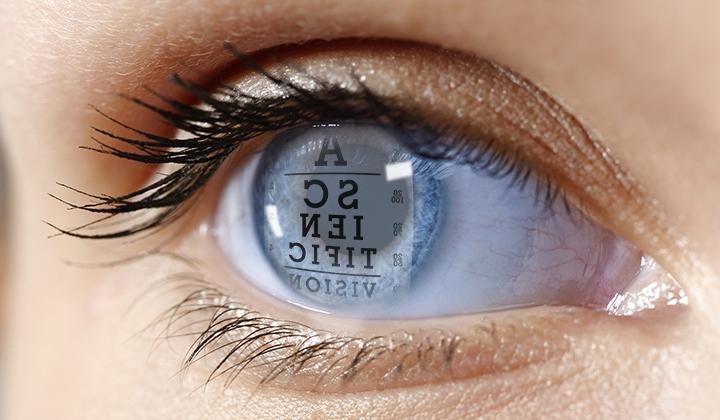校友迈克尔·布鲁尔, '90 and recent alumna 香农欣克利, '21, patent a diagnostic eye goggle system that detects diseases
Most scientific discoveries don’t come from “Eureka!或“啊哈”!“时刻. For many scientists, including physicist and alumnus Michael Brewer, they start with questions.
“当我在梅萨的时候, I ran the physics lab and helped start the National Physics Honor Society,他说. “Those experiences taught me to reach out into the world, not just be a pocket scientist that no one ever sees. It really helped me in creating leadership abilities and to step out and ask questions.”
Brewer met CMU biology major 香农欣克利 through the Order of the Eastern Star, a Masonic service organization of which they’re both members. Aspiring to be an optometrist like her father and grandfather, Hinkley shared with Brewer a paper she wrote for her English class. The paper focused on current trends in wavefront technology, which diagnoses vision errors by the way the eye refracts light, and some of the tools eye doctors use to detect corneal diseases.
“He read it and said, ‘We should build goggles!’ We wanted to be able to detect diseases of the body through the eye based off of what I said in my paper,欣克利说。.
Brewer is a serial inventor and entrepreneur with a degree in physics and has multiple patents. He is CEO of Allurdata, a data integration company based in Greenwood Village, Colorado.
“When I read what Shannon put together, I saw the opportunity to take that to another level,他说.
在一起, they researched and formulated a patent for a diagnostic eye goggle system that uses radiation and optical elements to acquire data from a user’s eye. A transceiver links to a master database and compares historical data gathered from other goggle users, which healthcare providers can use to diagnose disease and provide lens correcting instructions.
“Our idea was that if you could put a pulse oximeter on someone’s finger and be able to tell what their oxygen concentration in their blood is, then why couldn't’t you shine a light in someone’s eye and get that same data?欣克利说。.
Their patent under the company Renegade OptoPhysics LLC was approved in February 2020. 从那时起, they’ve reached out to Scotland’s University of Edinburgh about utilizing data from their VAMPIRE (vascular It’s about the proteins you find in tear fluid that have been implicated in certain cancers, neurodegenerative diseases such as Alzheimer’s and Parkinson’s disease and MS. 香农欣克利, CMU Biology Major assessment and measurement platform for images of the retina) retinal imaging software and have engaged with several companies about building the goggles.
“It’s been received well,” said Brewer. “In our discussions with Johnson & Johnson, the potential issue they saw was miniaturizing some of the chips for the ocular devices. There are probably going to be more challenges in front of us than behind us.”
Hinkley would like to see the goggles manufactured and used in optometry offices. Brewer mentioned the idea of Doctors Without Borders and making the goggles part of screenings in developing countries.
“There are literally hundreds of uses for this,” Brewer said.
The two alumni talk regularly and have weekly standing meetings to discuss new developments. Another agenda item is to add Hinkley’s senior thesis to the patent as well.
“It’s about the proteins you find in tear fluid that have been implicated in certain cancers, neurodegenerative diseases such as Alzheimer’s and Parkinson’s disease and MS,欣克利说。.
Hinkley has her sights set on attending Southern College of Optometry in Memphis, Tennessee her father’s and grandfather’s alma mater.
“Your eyes truly are the windows to your soul,欣克利说。. “I’ve been around patients when I worked for my dad. Seeing little kids who are able to see things clearly and read their books is actually pretty incredible and heartwarming. That’s the type of work that I really enjoy.”
